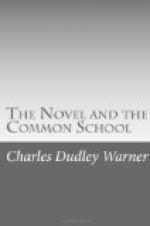The novel, mediocre, banal, merely sensational, and worthless for any purpose of intellectual stimulus or elevation of the ideal, is thus encouraged in this age as it never was before. The making of novels has become a process of manufacture. Usually, after the fashion of the silk-weavers of Lyons, they are made for the central establishment on individual looms at home; but if demand for the sort of goods furnished at present continues, there is no reason why they should not be produced, even more cheaply than they are now, in great factories, where there can be division of labor and economy of talent. The shoal of English novels conscientiously reviewed every seventh day in the London weeklies would preserve their present character and gain in firmness of texture if they were made by machinery. One has only to mark what sort of novels reach the largest sale and are most called for in the circulating libraries, to gauge pretty accurately the public taste, and to measure the influence of this taste upon modern production. With the exception of the novel now and then which touches some religious problem or some socialistic speculation or uneasiness, or is a special freak of sensationalism, the novels which suit the greatest number of readers are those which move in a plane of absolute mediocrity, and have the slightest claim to be considered works of art. They represent the chromo stage of development.
They must be cheap. The almost universal habit of reading is a mark of this age—nowhere else so conspicuous as in America; and considering the training of this comparatively new reading public, it is natural that it should insist upon cheapness of material, and that it should require quality less than quantity. It is a note of our general intellectual development that cheapness in literature is almost as much insisted on by the rich as by the poor. The taste for a good book has not kept pace with the taste for a good dinner, and multitudes who have commendable judgment about the table would think it a piece of extravagance to pay as much for a book as for a dinner, and would be ashamed to smoke a cigar that cost less than a novel. Indeed, we seem to be as yet far away from the appreciation of the truth that what we put into the mind is as important to our well-being as what we put into the stomach.
No doubt there are more people capable of appreciating a good book, and there are more good books read, in this age, than in any previous, though the ratio of good judges to the number who read is less; but we are considering the vast mass of the reading public and its tastes. I say its tastes, and probably this is not unfair, although this traveling, restless, reading public meekly takes, as in the case of the reading selected in the newspapers, what is most persistently thrust upon its attention by the great news agencies, which find it most profitable to deal in that which is cheap and ephemeral. The houses which publish books of merit are at a disadvantage with the distributing agencies.




